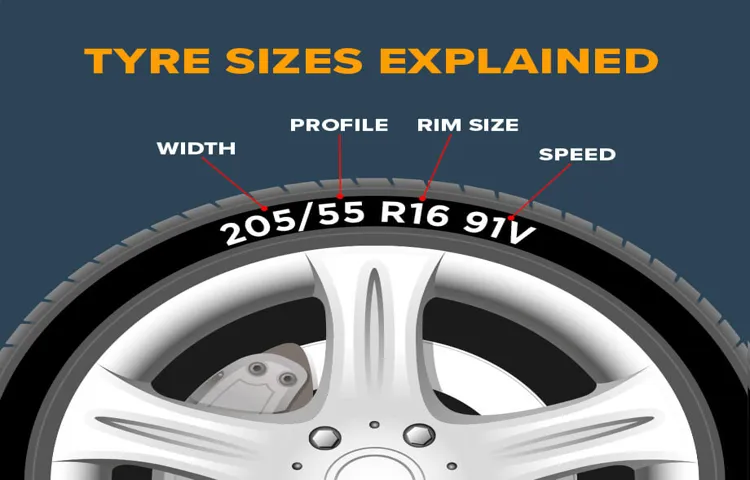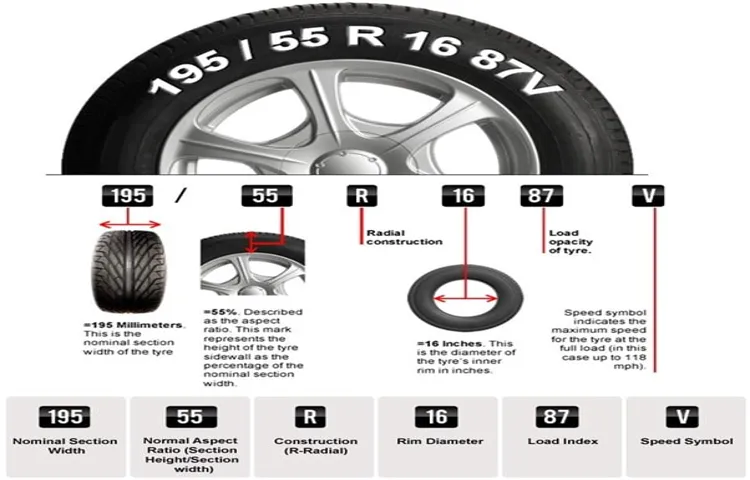As a car owner, it’s essential to understand the weight of the different components of your vehicle, especially the tires. But have you ever wondered how much a 35-inch tire weighs? If you’re planning to upgrade your ride or simply curious about tire weights, this comprehensive guide is for you. Firstly, you need to consider the type of tire you’re talking about.
Different tire designs, materials, sizes, and manufacturers have varying weights that can range from anywhere between 20 to 100 pounds. A 35-inch tire is a common size for off-road vehicles, and the weight can vary depending on the brand and model. For example, a 35-inch Nitto Terra Grappler tire weighs around 70 pounds, while a 35-inch Pro Comp Xtreme MT2 tire weighs around 75 pounds.
This significant difference in weight can affect your vehicle’s performance, stability, and fuel economy. Therefore, it’s crucial to select the right tire that fits your car’s specification and intended use. Apart from the tire weight, other factors can affect your car’s overall weight, contributing to its efficiency.
These include the engine’s power, gas tank capacity, cargo load, and passengers’ weight. In conclusion, understanding your tire’s weight and the impact it has on your vehicle will help you make informed decisions when selecting tires. So, the next time you’re shopping for tires, make sure you don’t overlook this crucial factor.
Overall, strive to find a balance between your vehicle’s performance, safety, and efficiency.
Table of Contents
Understanding Tire Weight
If you’re considering upgrading your vehicle’s tires, it’s important to understand their weight. One common question is, “how much does a 35 inch tire weigh?” The answer, unfortunately, isn’t straightforward. The weight of a tire depends on several factors, including its size, construction, and intended use.
However, as a general rule, larger tires tend to weigh more than smaller ones. A 35-inch tire, which is considered fairly large, can weigh anywhere from 50 to 80 pounds or more. If you’re planning to install these tires, it’s crucial to ensure that your vehicle’s suspension and brakes can safely handle the added weight.
It’s also important to note that heavier tires can negatively impact your vehicle’s fuel efficiency and handling, so consider your driving needs and preferences before making a final decision.
What Factors Affect Tire Weight?
Tire weight is an important consideration for drivers as it can affect fuel efficiency, handling, and overall performance. The weight of a tire is influenced by a variety of factors, including the size, tread design, construction materials, and intended use. Generally, smaller tires will weigh less and larger tires will weigh more, as will tires with more aggressive tread patterns.
Additionally, tires made with lightweight materials such as carbon fiber or Kevlar will be lighter than those made with heavier materials like rubber or steel. The intended use of the tire also plays a role; tires designed for performance or off-road use will typically be heavier than those designed for everyday driving. Overall, understanding the factors that influence tire weight can help drivers make informed decisions when selecting tires and optimizing their vehicle’s performance.

Why is Tire Weight Important?
Tire Weight Have you ever thought about the weight of your car’s tires? While it may not seem like an important factor to consider, tire weight can actually play a significant role in your vehicle’s performance. Heavier tires can create more momentum, making it harder for your car to accelerate and maneuver. On the other hand, lighter tires allow for quicker acceleration and more agile movements on the road.
Additionally, the weight of your tires can also affect your car’s fuel efficiency. Heavier tires will require more energy to move, using up more fuel in the process. For this reason, it’s crucial to choose the right tire weight for your vehicle based on your driving needs.
So the next time you’re shopping for tires, don’t forget to consider the weight as a crucial factor in your decision-making process.
Calculating the Weight of a 35-Inch Tire
If you’re wondering how much a 35-inch tire weighs, the answer isn’t as straightforward as you might think. The weight of a tire can vary depending on several factors, such as its design, construction, and materials. However, on average, a 35-inch tire for a truck or SUV can weigh between 60 to 80 pounds.
This weight might seem heavy, but it’s necessary to support the larger size and heavier weight of these vehicles. When considering purchasing or replacing a 35-inch tire, it’s essential to check the weight specifications to ensure it’s compatible with your vehicle’s capabilities. Additionally, remember that other components like rims and brakes can add to the total weight, so it’s crucial to factor those in as well.
Step-by-Step Calculation Guide
Calculating the weight of a 35-inch tire may seem like a daunting task, but with some simple steps, you can determine its weight accurately. First, you need to know the tire’s dimensions, which are usually indicated on the tire’s sidewall. The width, aspect ratio, and diameter of the tire can help you calculate its volume.
Once you have the tire’s volume, you can use the density of the tire’s material to determine its weight. The density of rubber, which is the primary material used to make tires, is approximately 5 grams per cubic centimeter.
Therefore, if you have the tire’s volume in cubic centimeters, you can multiply it by 5 to get its weight in grams. However, if you want to get the tire’s weight in pounds, you need to convert grams to pounds.
One gram is equal to 0.00220462 pounds. So, if you have the weight of the tire in grams, you can multiply it by 0.
00220462 to get its weight in pounds. In summary, calculating the weight of a 35-inch tire involves determining its volume using its width, aspect ratio, and diameter, then multiplying the volume by the density of the tire’s material (5 g/cm3).
Finally, you can convert the weight from grams to pounds by multiplying by 0.0022046 With these steps, you can quickly and easily determine the weight of any tire, including a 35-inch tire.
Using Online Tools
Calculating the weight of a 35-inch tire can be a tricky task, but luckily there are online tools available to help simplify the process. One useful tool is a weight calculator that allows you to input the dimensions of your tire and receive an accurate weight measurement. This can be especially helpful if you are planning on transporting the tire and need to know the weight for logistical purposes.
It’s important to note that the weight of a tire can vary based on factors such as the type of tire, the brand, and the tread pattern. Additionally, the weight of a tire can have an impact on the performance of your vehicle, so it’s essential to ensure that you have the correct weight measurement before making any modifications. Overall, utilizing online tools can be a valuable resource in determining the weight of your 35-inch tire and ensuring that your vehicle is operating at its optimal level.
Popular 35-Inch Tires and Their Weights
Are you thinking of upgrading to 35-inch tires for your off-roading adventures? It’s important to know the weight of these larger tires before making a purchase. The weight can affect performance, fuel efficiency, and even the overall look of your vehicle. Some popular 35-inch tires and their weights include the BF Goodrich Mud-Terrain T/A KM2 at 84 pounds, the Nitto Trail Grappler M/T at 94 pounds, and the Toyo Open Country M/T at 88 pounds.
Keep in mind that the weight can vary depending on the specific tire model and manufacturer. Make sure to do your research and consider the weight when making your decision on which 35-inch tire to choose. So, how much does a 35-inch tire weigh? It depends on the tire, but now you have an idea of what to expect when shopping for these beastly off-road tires.
Brand Comparison: Which Tires are Lightest?
When it comes to choosing the right tire for your vehicle, weight is a crucial factor to consider. It affects your vehicle’s fuel efficiency, performance, and handling. If you’re looking for popular 35-inch tires, you might want to know which ones are the lightest.
After all, the lighter your tires, the less power your engine needs to keep them rolling. In our brand comparison, we found that the Nitto Trail Grappler M/T and Toyo Open Country M/T are among the lightest 35-inch tires on the market. The Nitto Trail Grappler M/T weighs 68 pounds, while the Toyo Open Country M/T weighs 72 pounds.
In comparison, the BFGoodrich Mud-Terrain T/A KM3 weighs 83 pounds, and the Cooper Discoverer STT Pro weighs 76 pounds. So, if you want a set of light and durable tires, the Nitto and Toyo options are worth checking out. They provide excellent traction, stability, and durability, without adding unnecessary weight to your vehicle.
A Closer Look at Specific 35-Inch Tires and Their Weights
If you’re looking to upgrade your vehicle with 35-inch tires, it’s important to consider their weight. Different tires have varying weights, and the weight can affect your vehicle’s performance. Let’s take a closer look at popular 35-inch tires and their weights.
The Nitto Trail Grappler weighs around 80 pounds each, making it one of the heaviest options on the market. The BFGoodrich Mud-Terrain T/A KM2, on the other hand, weighs around 72 pounds each. The Goodyear Wrangler MT/R with Kevlar is another popular option, weighing in at around 70 pounds each.
Overall, it’s crucial to choose a tire that balances weight with performance, and fits your vehicle’s specifications. Keep in mind that a heavier tire can impact your fuel economy and acceleration, but can also offer more durability and support for off-roading adventures. Consider your driving needs and preferences when selecting the best tires for your vehicle.
Conclusion: Is Tire Weight a Priority?
In conclusion, the weight of a 35 inch tire really depends on the specific tire brand, style, and construction. Asking “how much does a 35 inch tire weigh?” is a bit like asking “how long is a piece of string?” The answer can vary greatly. However, one thing we can be sure of is that if you’re trying to lift one of these bad boys on your own, it’s going to feel like a whole lot more than just a number!”
FAQs
What is the standard weight of a 35-inch tire?
The weight of a 35-inch tire can vary depending on the brand and model, but on average, it can weigh between 50 to 70 pounds.
Can the weight of a 35-inch tire impact the performance of a vehicle?
Yes, the weight of the tire can impact the performance of the vehicle, especially in terms of acceleration, fuel efficiency, and overall handling.
How can I determine the weight of my 35-inch tire?
You can check the manufacturer’s specifications or use a tire scale to weigh your 35-inch tire accurately.
Does the weight of a 35-inch tire affect its durability?
No, the weight of the tire does not directly affect its durability. However, heavier tires may wear out faster than lighter ones due to increased pressure on the vehicle’s suspension system.
What factors can contribute to the weight of a 35-inch tire?
The materials used in the tire construction, the tread design, and the size and thickness of the tire sidewalls can all contribute to the weight of a 35-inch tire.
What are some tips for reducing the weight of a 35-inch tire?
You can opt for lighter materials, choose a tread design that’s less aggressive, or switch to a smaller tire size to reduce the weight of your 35-inch tire.
How does the weight of a 35-inch tire impact its off-road performance?
Heavier tires can provide better traction in off-road conditions, but they can also cause the vehicle to sink in soft terrain. Lighter tires may have less traction but can provide better overall handling and control.



